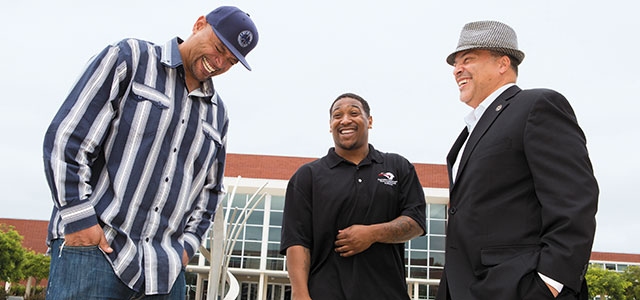Community advocate DeVone Boggan knew it would be a tough sell – maybe the toughest of his life.
But desperate times call for desperate measures and Richmond, Calif. was sweating in 2007. The community of 100,000, north of Berkeley, had witnessed an alarming 47 murders and wore the tag of one of the nation’s most dangerous cities. Local officials were mulling a request for Gov. Arnold Schwarzenegger to call in the National Guard.
Boggan had a more radical idea – take the crime problem to the criminals.
The newly hired neighborhood safety director persuaded Richmond’s administration to launch a strategic plan, resulting in Operation Peacemaker, a paid fellowship that recruits violent offenders into an incentive-driven, self-reform plan. Today Boggan eyes his native Michigan as a state where he can advance the program towards a national model.

“Now we have this agency that’s solely focused on figuring out, from a non-law enforcement perspective, how we can reduce gun violence,” says Boggan, who described Operation Peacemaker’s success in a 2015 New York Times essay.
Five years after its official launch in 2010 with 25 young male participants, Richmond recorded a 76 percent reduction in murders and a 69 percent reduction in gun assaults.
While receiving plenty of criticism for paying fellowships of up to $1,000 monthly, Operation Peacemaker requires 10 to 12 hours of commitment to a Life Management Action Plan (MAP) by those branded as troublemakers. Participants agree to what Boggan calls “evidence-based practices,” including life skills training, cognitive behavioral therapy and subsidized employment.
Rewards for following the MAP include attending conferences and special events as far away as Spain, Dubai, and South Africa, as fellows advance through the 18-month program. Boggan says exposing young men to the vast world beyond their neighborhoods expands their minds and lets them envision more fulfilling lives.
“A big part of what we’re trying to do with these young men is neutralize their gun violence activity,” he adds, “but it’s also about trying to mainstream them. What I mean when I say ‘mainstream them’ is you and I have to figure life out, and now they’re better prepared to start figuring it out, too.
“We’re putting a lot of healthy engagement and resources around them and pushing them to think a lot more about their values, the roles they play in their community, and what they want to do with their lives.”
Born in Grand Rapids, Boggan also lived in Flint and Lansing before heading west to attend University of California. Before becoming Richmond’s neighborhood safety director he worked at a non-profit where he “spent a lot of time getting to know more vulnerable populations.”
In March he founded Advance Peace, a non-profit designed to further the program’s strategy for reducing America’s 11,000 annual gun-related homicides, which government officials have called a public health crisis. Cities slated to implement the fellowship include Oakland, Calif., Washington and Toledo, Boggan says. He’s eager to meet with groups and agencies in Detroit and other Michigan communities, like Lansing, where he has relatives.
While program critics say it’s backward to push those on law enforcement’s radar to the front of the community resources and personal perks line, Boggan says the impact supports the method. Operation Peacemaker’s streetwise team of “neighborhood change agents” recruits fellows into the program. That costs about $20,000 per person, compared with about $200,000, including insurance benefits, to hire a single Richmond police officer.
“Some of them don’t become model citizens right away, but they stop shooting as a conflict resolution tool,” he says.
“This is not a panacea. There are still 20 percent who tell us to go to hell.”

Operation Peacemaker has the right idea in targeting young adults by showing them a viable alternative to unhealthy lifestyles, says Quincy Jones, executive director of Detroit’s Osborn Neighborhood Alliance. The Alliance looks to help train, license and certify east side residents who have raw skills, like baking or hair-braiding, but lack legitimate careers.
“We want to help them become entrepreneurs,” says Jones, who spoke about sustaining neighborhoods at the recent 2016 Detroit Policy Conference.
In an era when traditional law enforcement and other long-standing institutions struggle to establish relationships with young people, Operation Peacemaker’s outside-the-box model for transformation is gradually gaining notice.
“We have a lot of community resources,” says Boggan, “but these types of resources seldom reach young men at this age.”
“I wanted to communicate with them through several mechanisms just how important they were.”
Supporting street safety: Crime prevention tips
- Join a block club or neighborhood watch group
- Get to know your neighbors, even if it’s only enough to know who lives at the house and their names
- Attend public safety meetings and police workshops
- Consider pepper spray or pepper guns instead of applying for a CCW
“I know a police officer who was a sergeant in the Marines. He and his friend both got robbed, and you couldn’t get any more trained in using a gun than he was,” says Dale Brown, founder of the Threat Management Center.


